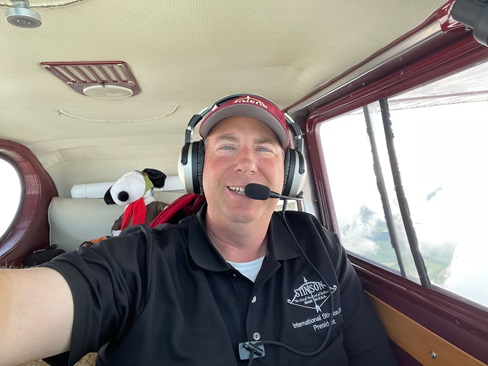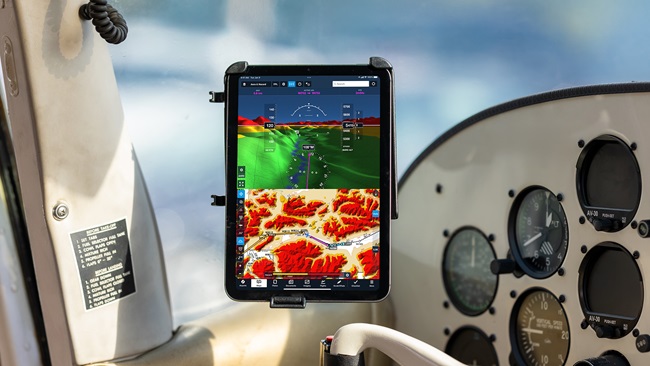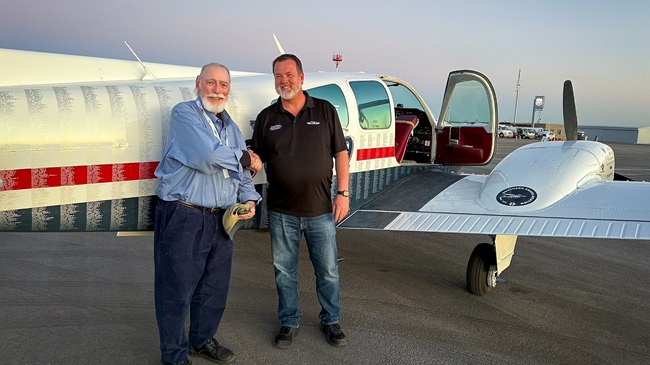AOPA asks for 'driver's license medical' for recreational pilot certificate
United States Department of Transportation
Docket Management System
400 7th St., SW., Room PL 401
Washington, DC, 20591-0001
| Re: | Petition to Amend the Recreational Pilot Medical Certification Requirements Proposed Amendments to Title 14 of the Code of Federal Regulations Section 61.23 (14 CFR § 61.23) |
Petition for Rulemaking
The Aircraft Owners and Pilots Association (AOPA), representing the aviation interests of more than 380,000 pilots and aircraft owners, submits this rulemaking petition to the Federal Aviation Administration (FAA) to amend the medical certification requirements for operating an aircraft while exercising the privileges of a recreational pilot certificate. AOPA requests that the FAA permit the use of a current and valid U.S. driver's license in lieu of an FAA medical certificate to meet the medical certification requirements of a recreational pilot certificate.
Summary
In carrying out the enabling legislation of the FAA, the Administrator is directed to consider, among other things, the requirements of general aviation as well as the public right of freedom of transit through the navigable airspace, 49 U.S. Code Section 40101(c). Also relevant is the legislative admonition that "the Administrator shall consider the following matters, among others, as being in the public interest: ...(3) encouraging and developing civil aeronautics...," 49 U.S. Code Section 40101(d).
This petition will reduce the costs associated with pursuing and maintaining a recreational pilot certificate. It directly affects individuals holding a student pilot certificate, seeking a recreational pilot certificate, holding a recreational pilot certificate, providing such flight training, and others holding a pilot certificate who may choose to exercise the privileges of a recreational pilot under the authority being requested by this petition.
This petition is in support of AOPA's comments and recommendations to the FAA's "Sport Pilot/Light Sport Aircraft" Notice of Proposed Rulemaking (NPRM), Docket No. FAA-2001-11133, Notice No. 02-03. In those comments, AOPA requested that the FAA modify the requirements for the recreational pilot certificate to permit the use of a current driver's license to meet the medical certification requirements, similar to that proposed by the FAA for the new sport pilot certificate.
A valid U.S. driver's license establishes an acceptable minimum medical standard because it validates evidence of basic health. While the licensing processes vary from state to state, authorities typically require applicants to attest to a basic level of health and minimum vision standard. If a recreational pilot is precluded from holding a driver's license, then he/she should not be eligible to operate an aircraft (unless the pilot obtained a third class medical certificate).
In addition, under § 61.53(b) if a pilot knows or has any reason to know of any medical condition that would affect his or her ability to exercise the authority of a recreational pilot certificate, then the pilot would have to refrain from acting as pilot in command. AOPA contends that this is a reasonable standard for recreational flying that is currently used for all pilots. AOPA also asserts that the data available in the National Aviation Safety Data Analysis Center accident database indicates that medical conditions are rarely causal factors in general aviation accidents.
This request is also in keeping with the FAA's desire to revise recreational pilot certificate privileges to align them with the proposed operational privileges for sport pilots, thereby making the recreational pilot certificate a more viable "lower cost alternative to a private pilot certificate." The option of a recreational pilot to hold a valid and effective U.S. driver's license in lieu of an FAA medical certificate further supports this contention.
AOPA's rulemaking petition is in the public interest and provides for an equivalent level of pilot safety.
Discussion
In 1989, the FAA published a final rule establishing the recreational pilot certificate. According to FAA records as of December 31, 1999, there are only 343 airmen holding recreational pilot certificates. Despite industry efforts to spark interest in recreational pilot certificates, recreational pilots currently comprise less than 0.1 percent of the total airmen in the United States. Most agree that this lack of interest in the recreational pilot certificate stems mainly from the amount of aeronautical experience required to gain the certificate, the limitations placed upon recreational pilots, and the lack of an alternative to an FAA third class medical certificate for recreational pilots.
In the preamble to "Sport Pilot/Light Sport Aircraft" NPRM, Docket No. FAA-2001-11133, Notice No. 02-03, the FAA states that: It intends to make several changes to 14 CFR § 61 to align the operational privileges of airmen holding recreational pilot certificates with those of airmen holding the newly proposed sport pilot certificate.
To that end, the FAA has proposed changes to 14 CFR § 61 expanding recreational pilot privileges to include operations in Class B, C, and D airspace, mirroring the privileges proposed for sport pilots.
These changes are consistent with its intent to "attract persons interested in flying basic aircraft" by making the recreational pilot certificate a more viable "lower cost alternative to a private pilot certificate." Amending the operational privileges of recreational pilots to equal those proposed for sport pilots significantly increases the utility of the recreational pilot certificate.
However, AOPA contends that the changes to recreational pilot privileges and limitations proposed in the Sport Pilot/Light Sport Aircraft NPRM fall short of making the recreational pilot certificate attractive to individuals desiring to exercise the privileges of a recreational pilot.
Current regulations permit recreational pilots to operate fixed-gear normal category aircraft up to 180 horsepower having four or less passenger seats. However, recreational pilot privileges and limitations set forth by 14 CFR § 61 limit recreational pilots to operations identical to those proposed for sport pilots and other airmen operating light sport aircraft. Regardless of the make/model of aircraft, a recreational pilot may only carry one passenger and may only engage in flight operations identical to those proposed for sport pilots. Recreational pilots are expressly prohibited from operating an aircraft for any purpose other than sport or recreation. Thus, it seems only appropriate that the FAA extend the proposed sport pilot driver's license medical certification requirements to include recreational pilots.
In arguing in support of a driver's license medical certification requirement for sport pilots and other airmen operating light sport aircraft, the FAA has stated, "The FAA proposed to require a pilot to hold and possess a U.S. driver's license because it provides generally accepted evidence of basic health. Further, the FAA believes the medical standards that permit an individual to drive an automobile in close proximity to other automobiles at high speeds provides an adequate level of safety...." AOPA agrees with and supports this assertion and urges the FAA to extend the driver's license medical certification option to recreational pilots, as they are also bound by regulation to operate their aircraft solely for "sport and recreational purposes."
In furtherance of the FAA's stated goal of aligning recreational pilot privileges and limitations with those proposed for sport pilots, AOPA asks that the amendments contained herein be implemented immediately.
Proposed amendment to 14 CFR § 61.23
AOPA proposes that 14 CFR § 61.23 be amended by deleting paragraph (a)(3)(ii) and redesignating paragraphs (a)(3)(iii) through (a)(3)(v) as (a)(3)(ii) through (a)(3)(iv), by redesignating paragraphs (b)(4) through (b)(8) as (b)(5) through (b)(9) and inserting a new paragraph (b)(4) to read as follows:
§ 61.23 Medical Certificates: Requirement and Duration.
* * * * * *
- Operations not requiring a medical certificate. A person is not required to hold a medical certificate:
* * * * * *
- When exercising the privileges of a recreational pilot certificate, or the privileges of a student pilot seeking a recreational pilot certificate, if that person holds and possesses a valid and current U.S. driver's license.
* * * * * *
Upon adoption of AOPA's rulemaking petition, 14 CFR § 61.23 would read as follows:
§ 61.23 Medical certificates: Requirement and duration
- Operations requiring a medical certificate. Except as provided in paragraph (b) of this section, a person:
- Must hold a first class medical certificate when exercising the privileges of an airline transport pilot certificate;
- Must hold at least a second class medical certificate when exercising the privileges of a commercial pilot certificate; or
- Must hold at least a third class medical certificate—
- When exercising the privileges of a private pilot certificate;
- Except as specified in paragraph (b) of this section, when exercising the privileges of a student pilot or recreational pilot certificate;
- When exercising the privileges of a flight instructor certificate, except for a flight instructor certificate with a glider category rating, if the person is acting as the pilot in command or is serving as a required flight crewmember; or
- Except for a glider category rating or a balloon class rating, prior to taking a practical test that is performed in an aircraft for the certificate or rating at the private, commercial, or airline transport level.
- Operations not requiring a medical certificate. A person is not required to hold a medical certificate:
- When exercising the privileges of a pilot certificate with a glider rating;
- When exercising the privileges of a pilot certificate with a balloon class rating;
- When exercising the privileges of a student pilot certificate while seeking a pilot certificate with a glider category rating or a balloon class rating;
- When exercising the privileges of a recreational pilot certificate, or the privileges of a student pilot seeking a recreational pilot certificate, if that person holds and possesses a valid and current U.S. driver's license.
- When exercising the privileges of a flight instructor certificate with a glider category rating;
- When exercising the privileges of a flight instructor certificate if the person is not acting as pilot in command or serving as a required flight crewmember;
- When exercising the privileges of a ground instructor certificate;
- When serving as an examiner or check airman during the administration of a rest or check for certificate, rating, or authorization conducted in a flight simulator or flight training device; or
- When taking a test or check for a certificate, rating, or authorization conducted in a flight simulator or flight training device.
For the reasons stated previously, AOPA requests that the FAA act favorably and expeditiously on this rulemaking petition as requested. AOPA stands ready to assist the FAA as it considers the regulatory changes proposed herein. Thank you for your time and consideration.
Sincerely,
Andrew V. Cebula
Senior Vice President
Government and Technical Affairs
July 15, 2002


